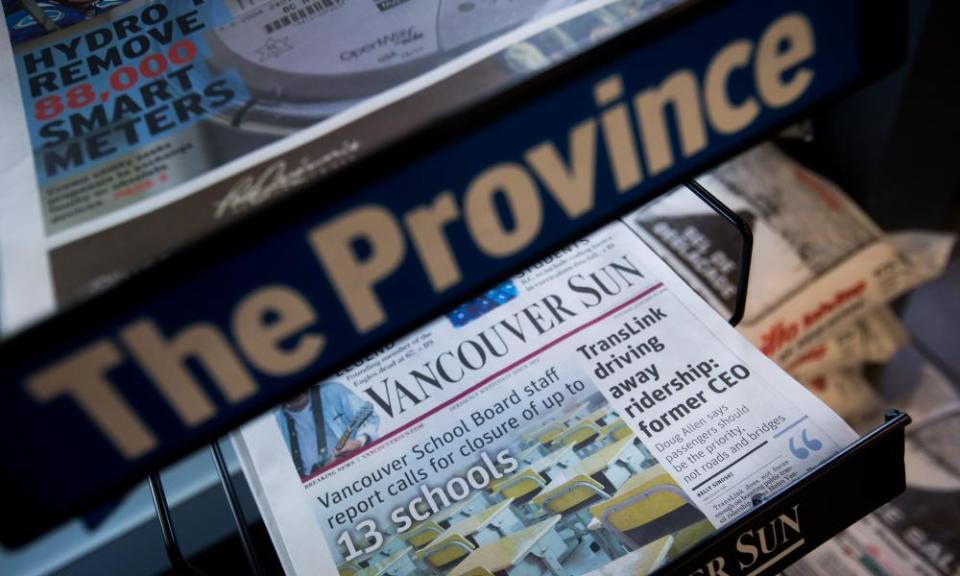Fifty new outlets, 250 journalists: Canadian startup unveils plan to revive local news

Local journalism has shed jobs faster than the coal industry, leaving swaths of North America as news deserts with little or no regular coverage.
But the grim prospects for an industry in decline didn’t deter the Canadian tech entrepreneur Andrew Wilkinson, who in 2019 hired a reporter and launched a daily newsletter in his home town, Victoria.
Emailed to subscribers early each morning, Capital Daily gave residents news highlights from around the city. Wilkinson bought advertising on Facebook and Google and subscribers started pouring in.
A year later, the venture had more than 40,000 readers, and within two years, the Capital Daily has transformed from morning digest of the city’s news into an enterprising outlet publishing long-form investigative features.
Now, building on the newsletter’s success, a startup media group has unveiled ambitious plans to replicate the model across the country.
Overstory Media Group, which operates newsletter-based journalism outlets in British Columbia, including the Burnaby Beacon, Decomplicated and the Capital Daily, has announced plans to hire 250 new journalists and launch 50 new outlets by 2023.
“I’ve always believed community media was always going to survive,” said chief executive Farhan Mohamed, who co-founded the venture with Wilkinson. “But it just has to be done in the right way.”
The announcement comes at a difficult time for Canadian media, which has seen the same mass layoffs and newspaper closures as in the United States.
In 2017, 36 community newspapers were shut down – the largest mass closure in Canadian history – and hundreds of reporters laid off after the country’s largest media companies, TorStar and PostMedia, announced a deal to trade 41 community newspapers with one another as a cost-saving measure.
And despite government efforts, the coronavirus pandemic has brought more losses to the sector: in the past year, 52 community newspapers have closed.
“You often hear that journalism is a calling, that people are willing to make less money to do something that they’re passionate about. That’s absolute nonsense. It’s a broken system,” said Mohamed. “There is so much talent that’s out there and it needs to be harnessed and given opportunity.”
While Overstory plans to offer resources to each of the publications, Mohamed envisions the brands operating independently. Funded by Wilkinson as well as growing advertising revenues, the group’s current titles have shown they are sustainable and profitable, Mohamed says.
The idea of expanding across the country reflects both the success of the current outlets and deeply underserved markets outside of the large urban centres, he said.
Toronto, Vancouver and Montreal dominate much of the country’s focus, but residents of smaller towns and cities have an equally strong hunger for local news.
“When we look at these communities, our goal is to be around for the next 30 or 40 years. We think in a generational sort of way,” he said.
The Capital Daily, Overstory’s marquee brand, has quickly become one of Victoria’s most-read outlets.
“Local journalism has this reputation as being stodgy, boring, low stakes. People think of it as covering the little league game and getting way too far into some dispute over a Walmart parking lot,” said its managing editor, Jimmy Thomson. “But local journalism has always been an incredibly important tool for keeping the people who make decisions that are the closest to us accountable.”
Much of the daily news is handled by larger legacy outlets in Victoria, giving the Capital Daily the opportunity to tell stories from different angles.
“We benefit greatly from the reporting that others do in the city,” he said. “But I hope our readers are getting something from us that they’re not getting from anyone else.”
He points to a recent investigation into a famous hotel in the area that took the reporter nearly four months to complete and earned praise from reporters at larger outlets.
The region is “incredibly lucky” to have the Capital Daily, tweeted Ian Young, Vancouver correspondent for the South China Morning Post. “It is very far from your typical ‘local’ journalism, which is not at all a slight on typical local journalists.”
While other legacy newspapers struggle to maintain circulation numbers, media startups like the Capital Daily don’t have a physical office space, nor do they have to worry about printing a physical newspaper.
Overstory’s expansion is the most ambitious in the country, but it isn’t alone in trying to reimagine local news.
In 2014, the investigative journalist Tim Bousquet founded the Halifax Examiner, which has since scaled up into a full-fledged news outlet. During a mass shooting in the province last year last year, the Examiner’s reporting into the police response won praise from outlets with far more resources.
Indiegraf works to give enterprising journalists the tools needed to start a digital publication that serves community readership.
While a number of journalism startups have found success in recent years by targeting a national market, including the Narwhal, Canadaland (which has also received funding from Tiny Foundation) and the Logic, Overstory’s bet is that communities are hungry for locally focused stories.
“People care about what’s happening around them, not just what’s happening on the other side of the country,” said Mohamed. “So why aren’t we spending enough time talking about that?”
Many have tried.
Since 2008, 165 new local news outlets have launched in 120 communities across the country, according to recent data from the Local News Project.
But over that same period, a total of 448 news operations have closed in 323 communities, most of which were local newspapers.
Despite the initial success, Thomson says the venture is still very much an experiment.
“A lot of people are trying different ways of doing journalism in Canada. We’re just one of them. I don’t know if we’re right,” he said. “I hope we are. I hope we’re solving a problem within journalism and that we can make this all work. But ultimately, we don’t know yet.”

 money
money 